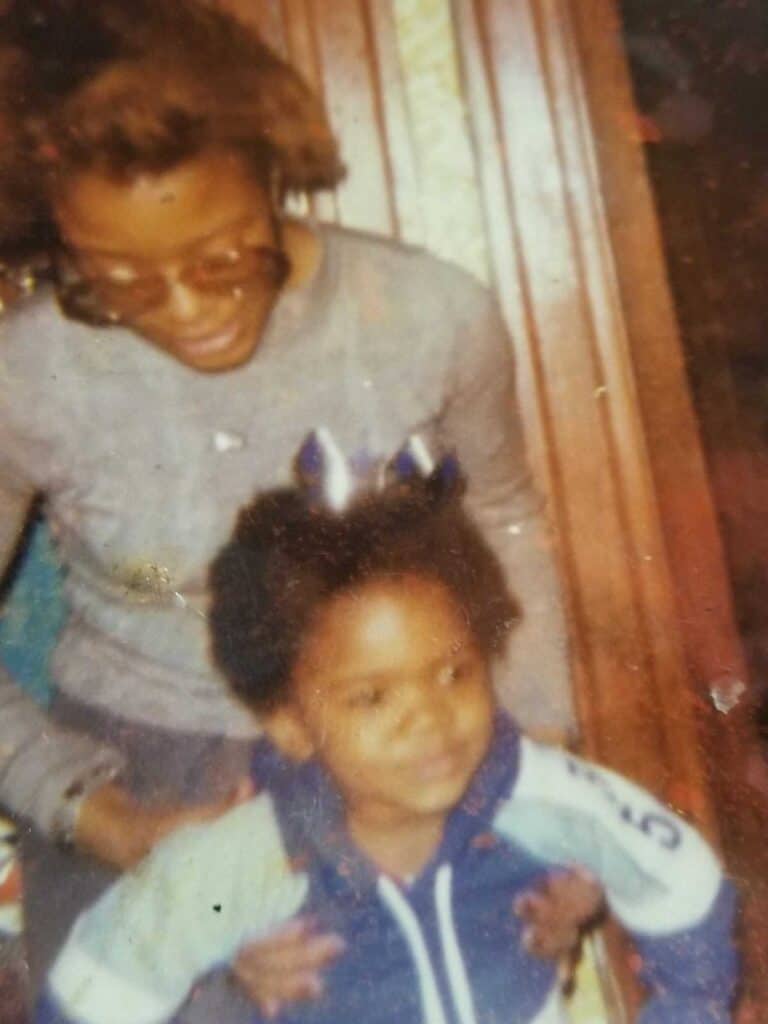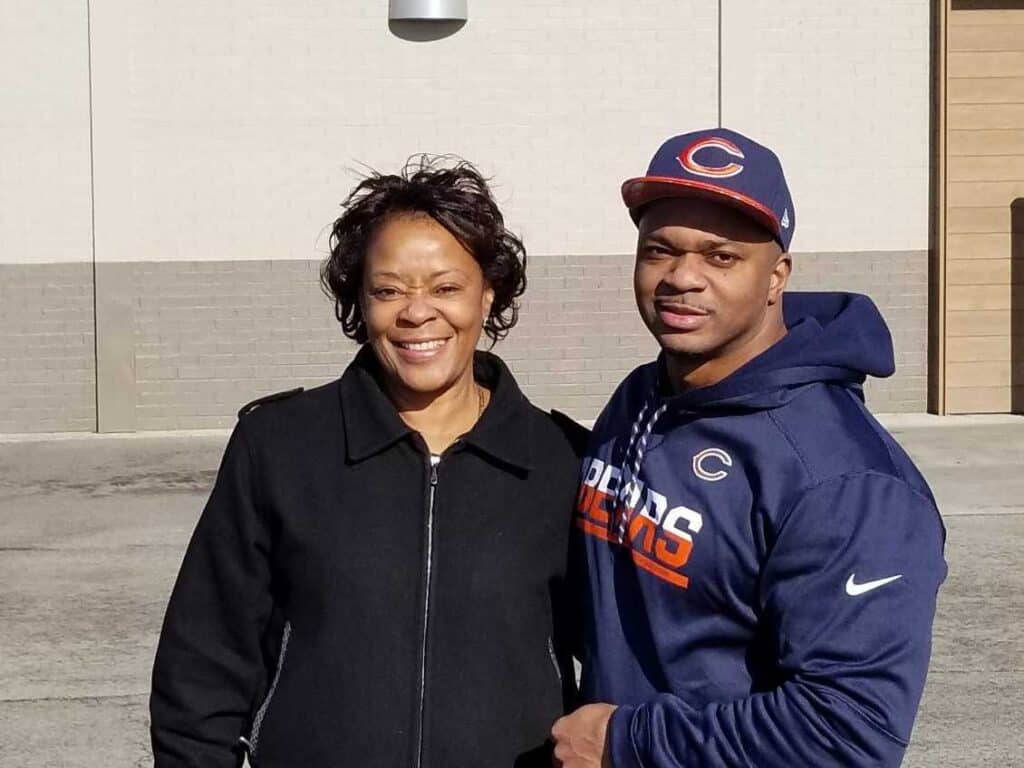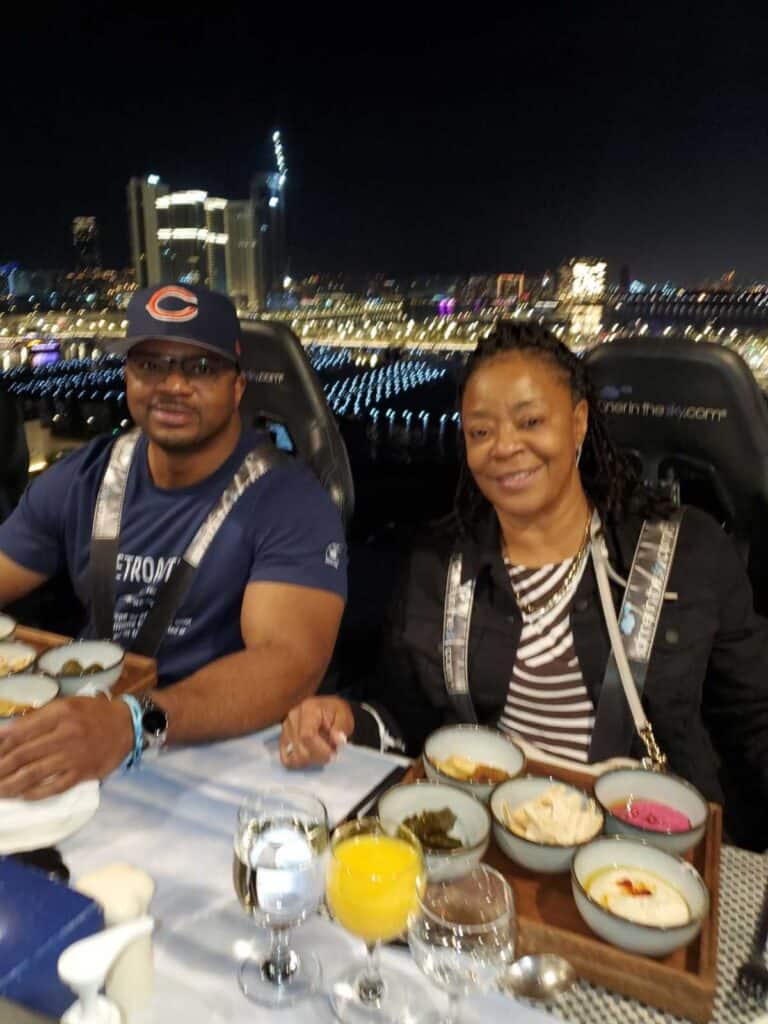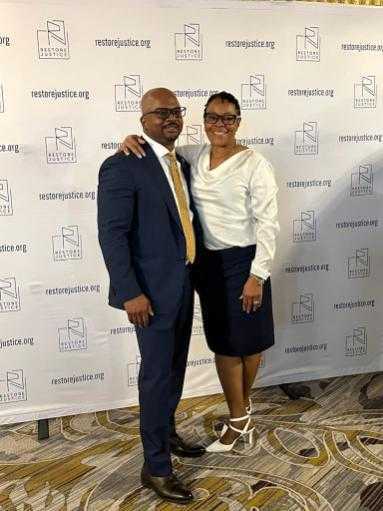Dianne Robinson
Dianne Robinson visited her son in prison for more than two decades after he received a life sentence as a child. Although each visit was an overwhelming experience, she did not want to miss the opportunity to see her only child. Since his release, she has been supporting and cheering for him as he strives for success.
“When he got that sentence, I remember being completely devastated because I couldn’t believe what we were told: on the first case, that he was going to be in for decades, and for the second one, that they gave him life. I was totally devastated, and I said, ‘That’s my only child.’” — Dianne Robinson
Dianne Robinson’s son Wendell was arrested at age 17 and later sentenced to life without the possibility of parole. During the first years of his incarceration, Dianne was struggling emotionally and financially, but she took it upon herself not to miss a single prison visit. When her son was released in 2018 after 25 years, she felt nothing but extreme relief and joy. Since his return home, they have created meaningful memories together and continue to share unforgettable moments of genuine happiness. “I’m glad that he comes home whenever he wants to. I don’t even have to be here. Sometimes, I come home, and he’s here, and it’s such a pleasant surprise. I treat him like a Santa fellow when he comes home. It’s such a joy!” Dianne says.
“A Latchkey Kid”
Although Wendell was an only child, he grew up in a large family on the West side of Chicago. According to Dianne, he was a sweet and inquisitive boy who spent a lot of time with his cousins and uncles. “Wendell was a latchkey kid. He was that child that was always smiling, always asking questions, always getting into something,” she says. “He had an old soul. He kinda grew up older because my youngest brother was nine, and they hung out together. So he grew up with him. He tagged along with my brother all the time,” she adds.
Dianne’s most vivid and cherished memory from her son’s childhood was their daily morning race to school. “We would ride the bus from 13th and Pulaski down to Polk Street, and then we would race down the street through the courtyard of the school to get him in school, and then I would go get on a train around town to work,” Dianne recounts.
According to Dianne, Wendell had a good childhood until he started hanging out with “older kids that didn’t live on the block I grew up on” who were selling drugs. Unfortunately, Wendell became involved in a “dangerous” lifestyle and, at age 17, was arrested for two murder cases, although he denied his involvement in both. “I’m not sure what transpired,” Dianne says.
Shortly after his arrest, Wendell was linked with another case. “There was that case, and they gave him another case. Back then, one of the things that happened is that the police would try to close cases. And so, because he had that one case and the second case happened on the block where his aunt lived, they just gave him that case,” Dianne laments.
“They Sent a Baby to Stateville”
At the time of Wendell’s arrest, Dianne was struggling with substance use disorder and trying to cope with the death of her parents. She was also financially unstable. Nevertheless, she managed to support her son throughout these difficult times. She attended his court appearances and visited him at the Cook County Jail, where he was housed. Sadly, she couldn’t afford the attorney’s cost, and he dropped the case a few days before the trial. Her son was then appointed a public defender. At the end of an emotionally challenging trial, Wendell was sentenced to life without the possibility of parole.
After his conviction, Wendell was sent to Stateville Correctional Center. “They sent a baby to Stateville. It was awful because he was so young,” Dianne comments. This was extremely difficult for her because Stateville was a maximum-security facility with a reputation for violence and poor conditions. Dianne remembers that in those early days, people who were incarcerated “had a free walk and wore their own clothes,” but “Stateville being such a violent environment, and Wendell being so young, he got in some trouble because he was trying to protect himself.”
While her son was incarcerated, Dianne made it a priority to visit Wendell regularly. “I didn’t care how far it was, I didn’t care what the weather was like, I didn’t care how long I was allowed to stay, my priority was to go and see him every month,” she comments.
Visitation was one of Dianne’s biggest challenges not only because she was struggling financially but because, like loved ones of incarcerated people, she had no control over the process. At Stateville, visits were limited to 45 minutes to an hour only and were often cut short or canceled without prior notice. “I remember riding the bus to Stateville, and when I got there, I couldn’t visit. They had not posted anything, and they were not giving any answers. They didn’t care how I got there. All they said was, ‘You have to leave.’” Dianne recalls. The bus ride was about two to three hours, and she had to leave around 6 a.m. to “catch the train downtown, then a bus, then another bus to Stateville.”
When her son was transferred to Menard Correctional Center, visitation time slightly increased to one to one-and-a-half hours. Though it was still not enough, and the ride also became longer, Dianne did not give up. She continued to ride the bus or drive for about six hours to see her son every month. She couldn’t afford a hotel, so she would “go and come back the same day,” which could be physically strenuous.
Despite her financial struggles, Dianne ensured she provided for her son. “I wanted to make sure that he had money on his books to buy some of the things that were on commissary and that appealed to him,” she explains. Her husband was very supportive throughout this journey, and they both provided much-needed financial assistance. Essentials available in the commissary, that is, the prison’s store, are very expensive, making it difficult for incarcerated people without resources to afford basic necessities. Dianne is also grateful to her youngest brother and some of her friends for their emotional support throughout her son’s incarceration.
“See Life Through My Eyes”
By the time Dianne was physically, emotionally, and financially stable, her son had been incarcerated for eight years. She was fully aware of what he’d missed during those years, so she became his eyes in the outside world. “A lot of things that we take for granted, a person who has been in prison for a while has no idea what we are talking about,” she comments. “I started being very descriptive during our conversations so that he would be able to see life through my eyes,” she shares. Whenever she sent pictures, she “would write these long notes on the back of the pictures, just to describe to him what was going on.”
When Dianne returned to school, she made it a point to discuss papers she was writing with her son. She would also send him her textbooks so that they could have conversations about her education.
Dianne strongly believed support was essential to keep her son hopeful. “I wanted to make sure that he had letters and pictures coming in and that he had money on his books to call me whenever he had call time. I was his connection to the outside world, and when you have all of those things, it makes you less bitter.”
Natural Life
It took several years for Dianne to get a real sense of Wendell’s natural life sentence. “I didn’t really understand what that meant because I always thought when they said life in prison, you would get out after about 20 to 25 years.” She explains how, at some point, it was her son who made it clear to her that he was going to die in prison if nothing changed. “One time in Stateville, we were talking about it, and because I always tried to be nice to him, I told him he’d be out when he was in his 40s. And he was like, ‘Ma, natural life means just that: natural life. That’s just what that means.’”
Eventually, Dianne could process the hard truth and understand how limited her son’s opportunities would be with this sentence. “I thought it was really harsh that he ended up with such a long sentence, and he was under 18,” she says. “We know that the brain of juveniles is not even fully developed yet. It makes no sense to take away their entire life without any hope for restoration and put them in a place where there is nothing to help them change.” Dianne specifically points to the lack of educational programs in carceral institutions. She shares how her son was only able to get a GED certificate and a barber’s license because nothing else was offered at the maximum-security facilities where he was housed.
Dianne felt even more powerless after each of her son’s unsuccessful attempts to pursue his claim of actual innocence. “He would do the paperwork, and he would get denied. His appeals were denied multiple times,” she recounts. Things changed when they were connected with a good lawyer. Dianne considers this encounter as the turning point in her son’s case. “As soon as we started working with her, things started moving forward,” she explains.
Dianne’s son was still fighting to obtain an actual innocence certificate when the U.S. Supreme Court ruled in Miller v. Alabama that it was unconstitutional to sentence juveniles to life without the possibility of parole for crimes committed when they were 17 years old or younger. After his petition was denied again, and following his lawyer’s strong recommendations, Wendell decided to pursue a Miller resentencing. After 25 years behind bars, he was released in 2018.
“You Can Still Be Whoever You Want to Be”
“Having my son, my only child, back was awesome,” Dianne says with a smile. The day they were reunited, she “ran and hugged him,” holding him as long as possible to make up for lost time. Every day after that first reunion and for an entire week, “we would get together, and I would take him shopping. We would hang out; we would eat wherever he wanted to eat. It was like him being a kid again,” Dianne remarks. She recalls how fascinated her son was with the cell phone she gifted him. “He was like a kid experiencing life for the first time in a long time. He was almost walking into stuff…” she trails off. “When he left, they had phones, but they were those big things that you couldn’t just stick in your pocket,” she chuckled.
It has been several years since Wendell came home, and for Dianne, it has been “awesome to see him blossom.” She remembers telling him, “You can still be whoever you want to be, you can still make something out of your life, even after 25 years in prison as long as you have the support, and as long as you are open to learn new things.” Dianne also made it clear to her son that he was not alone in this journey and could always count on her. “I told him, ‘The only thing that I ask is that if you start to struggle, you start to feel a certain kind of way, you give me a call, and we’re going to process it.’ I was like his on-call counselor,” she comments.
Surely, Wendell’s inquisitive nature was critical to his success. But Dianne also knows how important it was to support and provide him with the resources he needed. “When he came home, we had to find programs to help him reacclimate to society. He also had peers who had gotten out and who introduced him to other programs that helped him.”
Dianne knows her son was lucky to have resources that are not readily available to people after incarceration. “They dump these guys back into society without anything,” she laments. “In maximum-security prisons, guys are just sitting all day long, doing nothing. There is nothing for them to occupy their minds. Why not teach them all the skills they need so that if they ever got out they would be responsible for themselves and they won’t reoffend?” she asks.
“He Wants to Go Further and Do Great Things”
Wendell began his post-incarceration career as a truck driver, mostly because he couldn’t find another job. Like many people who return home after a lengthy incarceration, finding employment was a big hurdle to overcome. “There are still organizations that will not hire someone who has been convicted of murder,” Dianne notes. “There are a lot of organizations that say they are second chance organizations, but they’re really not because they’ll find a reason to say no to people who have a conviction in their background.”
Driving a truck “was stressful for him and for me,” Dianne says. “He knew he had to do everything right so that he didn’t get pulled over on the road. That was in the back of his head like it was in the back of mine,” she emphasizes.
Beyond the stress of truck driving, Wendell aspired to do more. He wanted to give back to the community by helping younger generations and supporting those he left behind bars. As a result, he started building partnerships with grassroots organizations to contribute to social change. “He partners with Legacy Reentry Foundation in Waukegan and once gave a speech about the power of partnership. He also does a lot of mentoring,” Dianne shares.
Dianne felt a huge relief when her son started his apprenticeship at Restore Justice, under the organization’s founder and then-executive director, Jobi Cates. A year later, he became the organization’s project manager. He subsequently served as program manager and program director. Drawing from his experience, he created the Future Leaders Apprenticeship Program (FLAP) to help those who, like him, came home after decades in prison. He was also part of the organization’s efforts to create new parole opportunities and to abolish life without parole for people 20 and younger in Illinois.
From her experience, Dianne understands how important it is for incarcerated people to have strong support and effective legal representation. “When I think about people who are in prison today, if they don’t have an attorney or somebody there on the outside speaking for them, they’re not going to get any action at all. None,” she says. “And even if they were wrongly convicted, if they don’t have the money for an attorney or somebody that’s doing it pro bono, nothing’s going to happen with their case.” For this reason, she is extremely proud of the work her son is doing to support those who are still incarcerated and their loved ones who are going through a similar experience.
Dianne is very proud of what her son has achieved so far. She knows “he wants to go even further and do more,” and she continues to encourage him. When Jobi stepped down in 2024, Wendell was unanimously appointed by the Board of Directors as Restore Justice’s new executive director. It is a huge responsibility, but Dianne is sure her son is ready and up for the challenge. “I am so impressed by his hard work and dedication. I know he will be an inspiring executive director,” she comments. “I saw him work so hard day in and day out. He’s set an awesome example for everyone who enters into his program. He’s exceeded all my hopes and dreams for him, and my love and pride for him will never waver,” she concludes.
More from the “More than a Conviction” Project
Up Next
Read the story of another loved one who was impacted by the criminal legal system in Illinois
Read moreOther Stories
Discover the impacts of juvenile life without parole sentences in Illinois from additional perspectives
Learn moreReport
Read the Restore Justice report on juvenile life without parole and extreme sentencing in Illinois
Read the report




